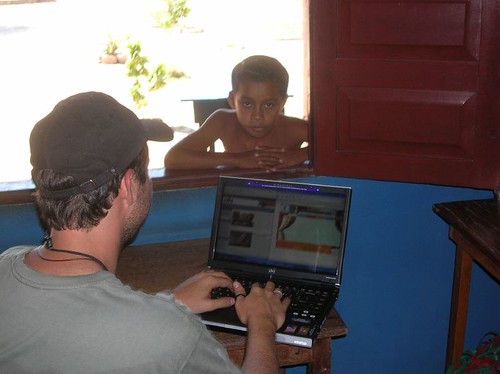 The best aspect of Internet is that it is a tool of world wide communication. Wikipedia defines the Internet as "The Internet is a global system of interconnected computer networks that use the standard Internet protocol suite (TCP/IP) to serve billions of users worldwide"(Wikipedia). The aspect creates a new style of people's communication because distance becomes meaningless on the Internet. For example, "It is now entirely possible for someone in rural America to carry on conversations with people from Moscow, Paris and Jakarta, all at the same time" (eHow.com). In this great development of communication style, social networking sites work crucial roles while millions of users access to these sites from many countries. Businesses also got great advantages. Internet gives businesses a new place for marketing and advertising. For instance, "Creating a website benefits businesses because people can market their products and services without using traditional marketing techniques such as fliers, mailings and newspaper ads" (eHow.com). Internet also enables companies to have large and world wide customers data bases on the Internet, and it also enables to reduce office supplies because companies don't have to pay for expensive international mails (eHow.com). The global communication is the best advantage and aspect of Internet.
The best aspect of Internet is that it is a tool of world wide communication. Wikipedia defines the Internet as "The Internet is a global system of interconnected computer networks that use the standard Internet protocol suite (TCP/IP) to serve billions of users worldwide"(Wikipedia). The aspect creates a new style of people's communication because distance becomes meaningless on the Internet. For example, "It is now entirely possible for someone in rural America to carry on conversations with people from Moscow, Paris and Jakarta, all at the same time" (eHow.com). In this great development of communication style, social networking sites work crucial roles while millions of users access to these sites from many countries. Businesses also got great advantages. Internet gives businesses a new place for marketing and advertising. For instance, "Creating a website benefits businesses because people can market their products and services without using traditional marketing techniques such as fliers, mailings and newspaper ads" (eHow.com). Internet also enables companies to have large and world wide customers data bases on the Internet, and it also enables to reduce office supplies because companies don't have to pay for expensive international mails (eHow.com). The global communication is the best advantage and aspect of Internet.The worst aspect of Internet is digital divide, basically caused by disparity between rich and poor. Digital Divide Institute defines the term, digital divide, as "the gap between those who can benefit from digital technology and those who cannot" (Digital Divide Institute). Even though the Internet have been spread widely, it doesn't mean all people have an access to Internet. Here's a statistic of Internet users in the world. It shows 30% of people can use Internet and 70% of people can't in 2011. This map (treehugger.com) show which countries uses internet a lot more visually. It is obvious that developed countries dominate the Internet share. Thus the majority of 30% people who use the Internet live in developed countries. It enlarges the gap between rich and poor more and more. Some groups are now working hard to close the digital divide by inventing Solar WiFi system, sending people with technical skills and providing low costs PC (treehugger.com). The biggest dark side, digital divide, will remain as the worst aspect of Internet until everyone all over the world get their access to the global communication.
The best aspect of Internet is that it enables people communicate globally, and the worst aspect is the digital divide. Just because the advantage is so big, the disadvantage is surprisingly big as well. The powerful revolution of Internet have made a light side and a dark side at the same time.
Image: Untitled by Marcelomdrs through CC licensing.
0 件のコメント:
コメントを投稿